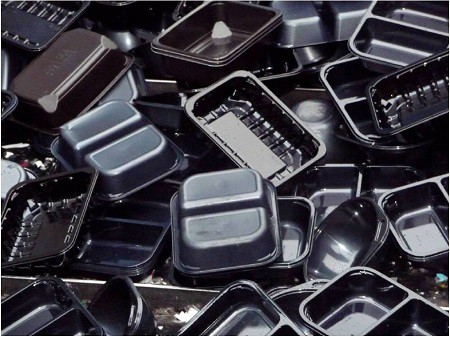Ahead of the Christmas period, consumers are being given advice on how to dispose of ‘confusing’ packaging items.
The Recycling Association’s message to the general public is “If in doubt, throw it out” when recycling at home.
According to the Association, packaging is becoming increasingly complex, with local authorities adopting “completely different” collection schemes, adding to the confusion.

In the past, black plastic meat trays have been picked out by The Recycling Association as among the ‘confusing’ packaging items
The Association made clear that clean, single material plastics, paper, metal cans and glass should always be recycled.
However, if an item of packaging is made of multiple materials – leading to confusion over whether it can be recycled or not – the Association recommends: “It is better to put it into your general waste bin than your recycling bin.”
This is because almost one fifth of the material collected for recycling from households is material that cannot currently be recycled, the Association claims.
Contamination
The reason for the recommendation is to tackle contamination, Simon Ellin, chief executive of the Recycling Association, explains. “Some people may think they should put it in the recycling just in case it can be recycled and do the right thing. But often, this can lead to more contamination of the materials that can genuinely be recycled.”
“So our advice to people is ‘If in doubt, throw it out’ as that is better than putting the wrong items in the recycling bin,” he said.
“Some people may think they should put it in the recycling just in case it can be recycled and do the right thing. But often, this can lead to more contamination of the materials that can genuinely be recycled.”
Simon Ellin
Recycling Association
As part of a survey carried out by the Recycling Association, members of the public were questioned over whether they would recycle common household packaging in their recycling bin or not, or whether they were unsure.
Mr Ellin said the survey supports the Association’s view that many common household items are confusing to the public.
He explained, while the public generally understand that products made from one material such as cans, plastic bottles, or cardboard boxes can be recycled, “when it comes to more complex multi-material packaging and products, people become less sure.”
“This means that some people will put items in their recycling bin that may not be recyclable, and contaminate recyclable products,” he said.
Consistency
Mr Ellin said the Assocation would like to see more consistency in local authority collections. “For example, some local authorities collect black plastic meat trays and some don’t, even though this is currently a challenging material to recycle,” he added.
In response to the message from the Recycling Association, the Waste and Resources Action Plan (WRAP) has also called for more consistent messaging to consumers.
According to WRAP, its 2017 Recycle Now Tracker report found that just over half (53%) of UK households dispose of one or more items in the general rubbish that is in fact collected for recycling in their area. And, close to three quarters of UK households (76%) add one or more items to their recycling collection that is not accepted locally.
“Material quality has never been more important and contamination of recycling is a big problem in the industry. At the same time there is also material not being recycled that could be.”
Linda Crichton
WRAP
Linda Crichton, head of resource management at WRAP, said: “Material quality has never been more important and contamination of recycling is a big problem in the industry. At the same time there is also material not being recycled that could be.
“Engaging and more consistent messages to consumers is needed to overcome both problems and ensure that the right things go in the right bin.”
Advice
WRAP’s advice to the public is ‘check before you chuck’ and access tools such as its Recycle Now recycling locator, which it said is already used by more than 1 million people every year.
Ms Crichton continued: “We welcome the continued support from all our partners in the supply chain, including retailers, brands and local authorities for our consistency initiative which is about making it easier for people to know what they can and how to recycle.”
Related link
Recycling locator
The post Recyclers issue advice on ‘confusing’ packaging appeared first on letsrecycle.com.
Source: letsrecycle.com Packaging




